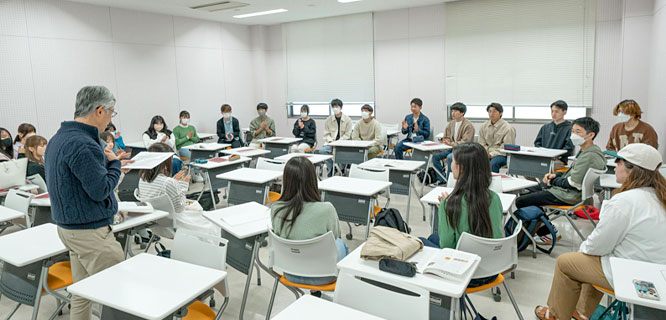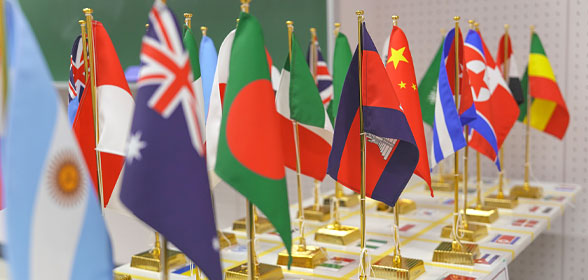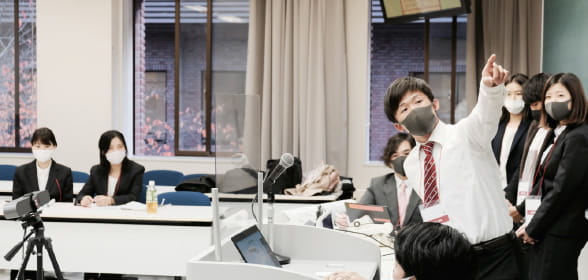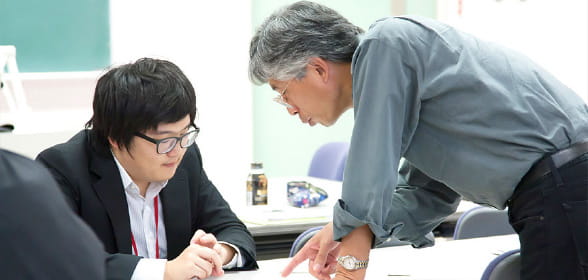Curriculum
- Global Studies Major
- American University Ritsumeikan University Joint Degree Program
- International Relations Major
- Often Asked Questions
International Relations Major

Graduation requirements and courses
Studying International Relations
In their first year, students will study「基礎演習Ⅰ・Ⅱ」,「国際関係学A・B」, General Education courses, and Foundation courses, where they will gain a foundation in the basic knowledge and skills necessary to study international relations. After their first year, students will choose one of the following programs, and from their second year on, they will dive deeper into a specialized subject in which they have an interest or concern. Students may also study specialized subjects outside of their selected program.
Foundation Courses- 国際関係学A・B
- 国際連合入門
- 平和学入門
- 近現代史
- 国際政治学
- 国際経済学
- 国際文化・社会学
- 日本外交論
- 国際行政学
- 国際関係思想
- 地域研究論A・B
- 基礎統計学
- International Order & Peace Program The past and present global order, as well as the outlook for the future, will be studied comprehensively. This will be done by examining international politics, international relations theory, international law, international economics, etc. From war to peace and human rights, new approaches will be sought in a search for solutions to a wide variety of challenges ranging from conflict to economic friction.
- International Cultural Understanding Program An important theme here is the respect for various cultures and value systems and the development of an inclusive society during these continually globalizing times. Many diverse cultures and societies will be compared and examined in a search for the road to multicultural symbiosis.
- International Cooperation & Development Program A pragmatic approach will be taken to the study of developing nations, international cooperation and assistance, international society, conditions for economic development, and economic inequality. Possible solutions to various issues will be explored by not only looking at international cooperation by governments and international organizations but by companies and NGOs as well.
- International Administration Program From diplomats working as government and UN officials to regional civil servants helping communities and more, through friendly competition, students seeking careers in government support positions will learn about global public measures as well as practical and theoretical approaches to domestic and international administration.
Area Studies
In the College of International Relations, great importance is placed on learning about actual regions around the globe, not just theory. In their second year, students will take courses in area studies as they delve deeper into their study of the history and culture of an area that interests them.
Four Years of Small Group Education
Year one through year four will consist of ongoing group education. Through things such as discussions and presentations that are only possible in the learning environment of a small group, students will, step by step, gain academic skills and the ability to complete their graduation research work.
After the completion of their second year, students will select a seminar course (専門演習 class) in which to participate for their remaining two years. While receiving advice from the 専門演習 faculty advisor, students will pursue research on a theme of their choice, and in the last semester of their fourth year, they will consolidate and conclude their graduation research.
Four Years of Small Group EducationForeign Language Education
During their first and second years, all students will study English. Students will be placed in an appropriate class according to their level, with specific goals set to be achieved. English skills will be improved in a step-by-step process, and special courses taught in English as well as study abroad programs will be made available. For those interested, the Intensive English I–VI courses will be open to those students wishing to improve their TOEFL® and IELTS scores.
In their first year, all students will select a second language to study from French, German, Spanish, Chinese, or Korean. Students from overseas must choose Japanese as their second language. In their second year, students wishing to continue their foreign language study may do so in intermediate and advanced-level language courses (advanced-level language courses, minor in foreign language communications, specialized foreign language courses, etc.).

Study Abroad
Studying abroad is optional, but approximately 30%–40% of students studying international relations participate in long-term (6 month–1 year) study abroad programs. Both prior to and after studying abroad, students may work on improving or maintaining their English ability by taking part in specialized courses taught in English. For more information on Ritsumeikan University’s study abroad program, see the International Center’s study abroad program website.
Centre for International Education Study Abroad Programme HP



